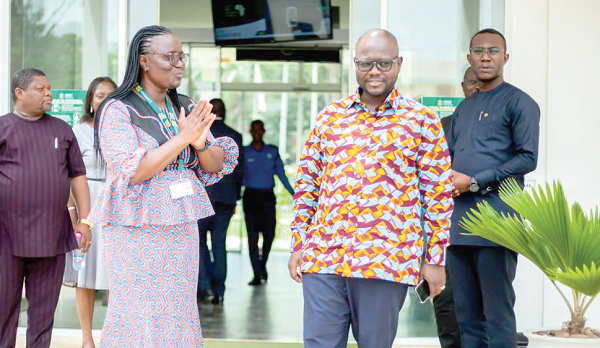
Ministry, KNUST collaborate to tackle housing challenges
The Ministry of Works and Housing is collaborating with the Kwame Nkrumah University of Science and Technology (KNUST) to enhance the government’s efforts to provide sustainable solutions to the works and housing sector of the country.
As part of the collaboration, the sector Minister, Francis Asenso-Boakye, last Tuesday led a team of experts from the ministry to meet with the Vice Chancellor of KNUST, Professor Rita Akosua Dickson, and authorities of the College of Art and Built Environment.
Speaking at the meeting, the minister who is also the Member of Parliament for Bantama, was optimistic that the collaboration between the ministry and KNUST would have a great effect on the performance of the ministry in ensuring a drastic reduction in the housing deficit.
“Our job as a ministry is to formulate policies, and you are also in the area of teaching and research, and there is no doubt that as a foremost institution of higher learning for the built environment there are possible areas that we can collaborate to better the lives of Ghanaians,” the minister, who is an alumnus of KNUST, said.
Policy formulation
Mr Asenso-Boakye said the ministry was going through a series of policy formulation and programmes which provided an avenue for collaboration with KNUST.
He said with an urban population of about 57 per cent and an urbanisation rate of 5.8 per cent, housing and urbanisation had become one of the most critical development issues the country was facing.
“This makes housing a big deal for all Ghanaians. Already we have a housing deficit of about 1.8 million housing units. And further studies also indicate that 60 per cent of Ghanaians require some sort of support from the government before they can access housing.”
“There are even 35 per cent of Ghanaians who cannot access housing if even government provides some support to them in terms of subsidies, which means that it is only five per cent of Ghanaians who can afford their own accommodation”, he revealed.
High cost
Mr Asenso-Boakye noted that high cost of building materials was one of the striking reasons the government had not been able to provide housing at an affordable rate for a significant section of the urban population, adding that most of the building materials used in the country were imported.
“The use of pozzolana, a highly active cementitious material, made from local clay and a good substitute for clinker which is used for cement production could be employed to replace clinker which is imported for the production of the ordinary portland cement currently in the market,” the minister added.
In that context, Mr Asenso-Boakye invited the College of Art and Built Environment and the School of Engineering to join the ministry to develop sustainable planning schemes and designs that would maximise spaces as well as construction methods that would ultimately lead to the reduction in the cost of construction.
Laws
The minister said the ministry had formulated various bills required for the sector to operate efficiently.
He said one of such bills that the ministry would like to seek collaboration with KNUST was the review of the Rent Act of 1963.
Collaboration key
Responding, Professor Dickson expressed joy over the minister’s resolve to collaborate with the university regarding the mandate of the ministry.
She said KNUST believed so much in such partnerships and collaborations.
The Vice Chancellor assured the minister that the university was ever ready to partner the ministry to find sustainable solutions to all the issues raised that were meant to solve the housing challenges of Ghanaians.
She further appealed to the minister to assist the university address the housing needs on its campus for both students and the staff.
“Over 70 per cent of the student population live in accommodation facilities outside the four walls of the university, a situation which creates all sorts of challenges, including security for students,” she stated.

